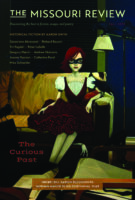Foreword | September 29, 2020
Foreword: Facing It
Speer Morgan
An old friend of mine called me in early May to tell me that he was alive, after all. He had caught covid-19 and been on a ventilator, his survival unlikely for several days. After three weeks in a hospital bed, he told me, “You don’t want to get this, Morgan.” Another friend, a writer and recently retired emergency-room doctor, sent me an e-mail summarizing the basics that he had learned about the virus from reading medical articles. He asked, too, if I remembered that in 1969, I had had a gun pulled on me by a revolutionary housemate. I didn’t, oddly enough, although I do remember this housemate repeatedly yelling at me for not being purely and totally revolutionary enough, and I do remember inhaling plenty of tear gas at demonstrations.
The events starting in Minneapolis and quickly spreading throughout the rest of the nation over the murder of George Floyd are indeed reminiscent of that year. Protests and less-than-peaceful demands for justice seem called for now, as they also did then, after Martin Luther King and Robert Kennedy were assassinated, along with what seemed like the endless dragging out of the Vietnam War. “So it goes,” as Kurt Vonnegut’s Billy Pilgrim says after the latest disaster in the endless series of disasters in his 1969 novel Slaughterhouse-Five. Pandemics and racism and riots and the lack of national leadership make us think, “So it continues to go–and when will it stop?”
This issue of TMR reminds me of the basic ideas of Stoicism, a philosophy that arose long ago as an approach to dealing with the seeming harshness and unfairness of life. Stoicism in different manifestations has been one of the more resilient philosophies in Western thought. It began with the teachings of Zeno in the marketplace of ancient Athens, and it lasted through six centuries of Greek and Roman thinkers, including Seneca and Marcus Aurelius. It influenced the epistles of the Christian Paul and many later classics of European literature. Laurence Sterne’s Tristram Shandy begins with an epigraph from Epictetus—“Not things, but opinions about things trouble men”—ironic in this case, since Sterne’s antihero is so overloaded with bookish doubts and opinions that he does well to get out of bed in the morning.
If you are a student, faculty member, or staff member at an institution whose library subscribes to Project Muse, you can read this piece and the full archives of the Missouri Review for free. Check this list to see if your library is a Project Muse subscriber.
Want to read more?
Subscribe TodaySEE THE ISSUE
SUGGESTED CONTENT

Features
Jan 08 2024
Foreword: Family Affairs
Family Affairs During the nineteenth century, observers from both sides of the Atlantic admired the relative looseness of American families while also criticizing a lack of multigenerational connectivity and… read more

Features
Dec 19 2023
Foreword: The Curious Past
The Curious Past The past is such a curious creature, To look her in the face A transport may reward us, Or a disgrace. – Emily Dickinson Jonathan Rosen’s… read more

Features
Jul 27 2023
Foreword: The New Realism
The New Realism I sometimes wonder what the dominant trend in literature is going to be called. Names for artistic periods and movements are hardly definitive, but they are useful… read more

